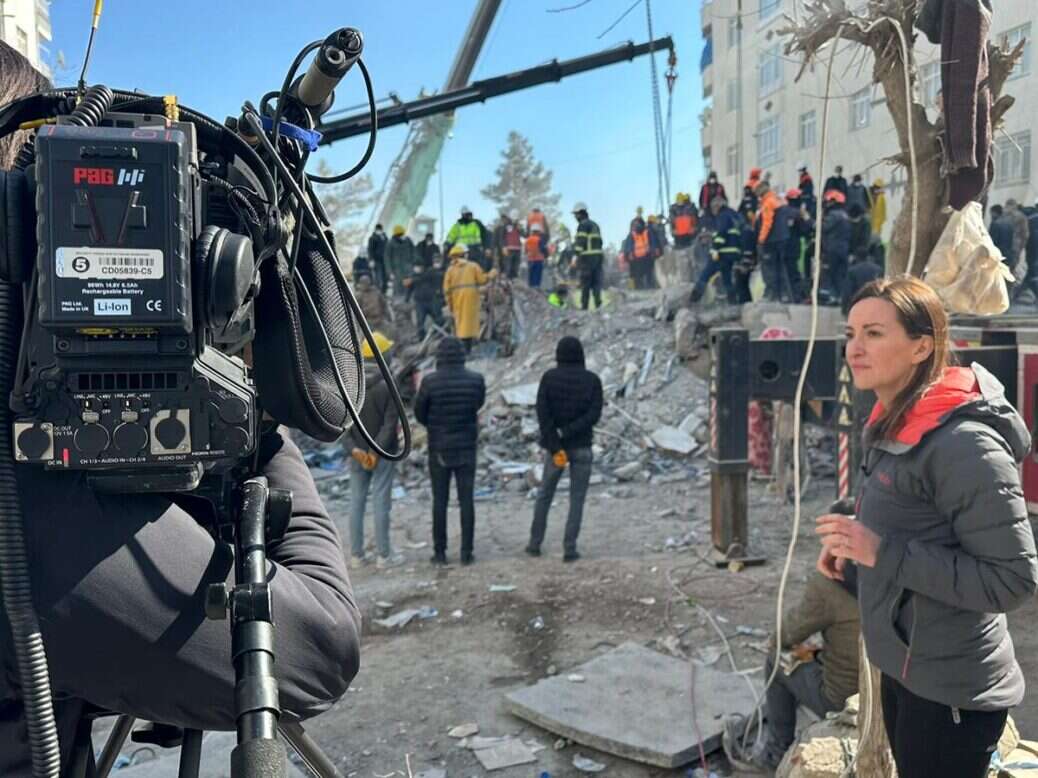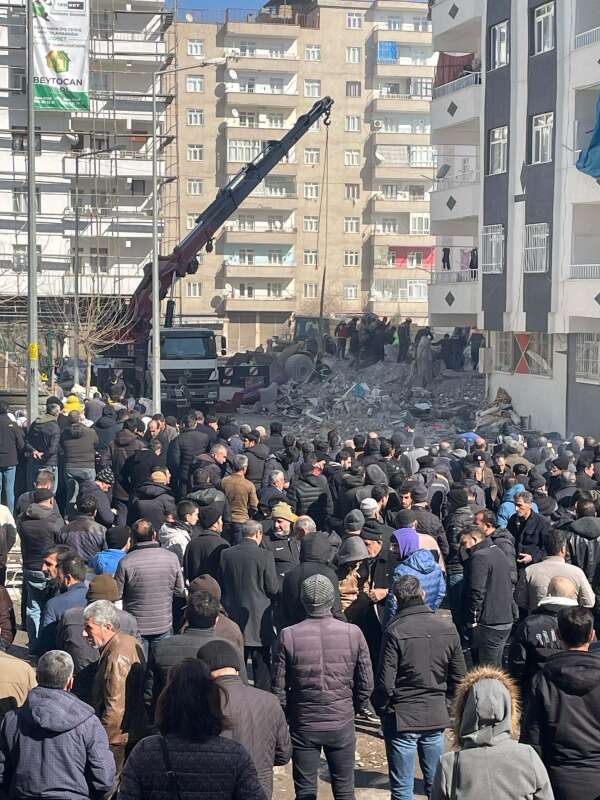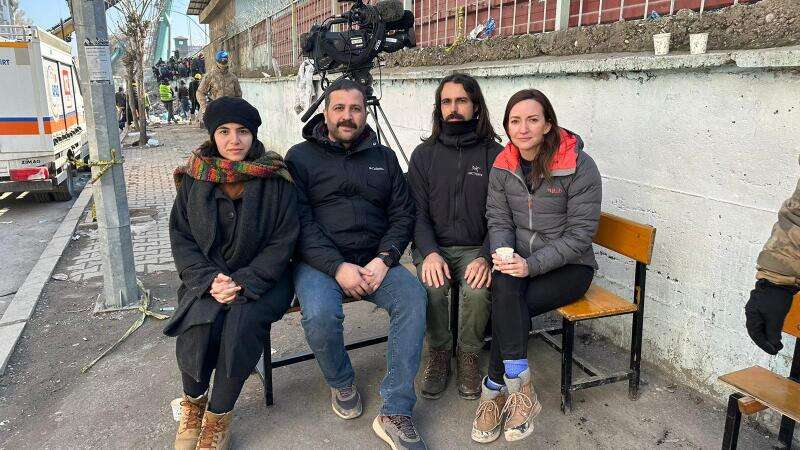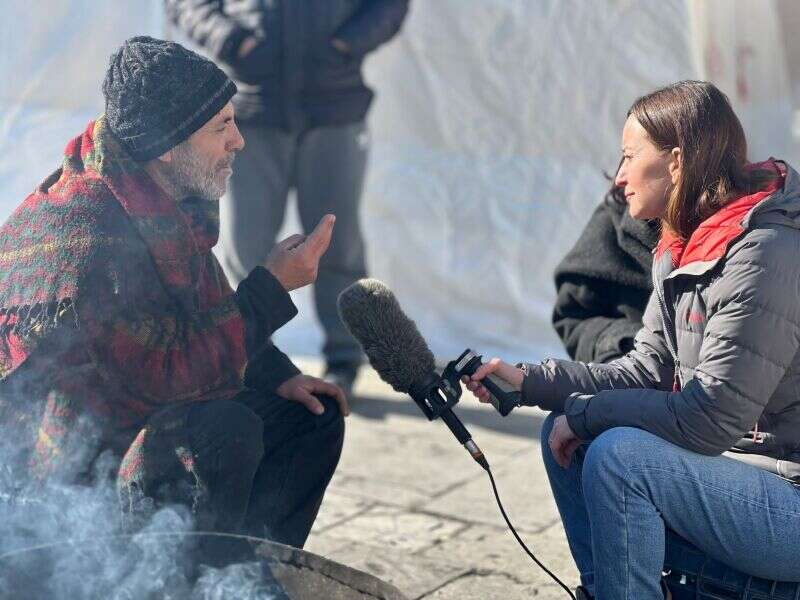
It’s hard to stop yourself from doing the maths. The building in front of you is flattened but you’re told it used to stand eight storeys high. There were four flats on each floor, so 32 families were sleeping when the earthquake struck.
Only 40 people made it out before the concrete came crashing down. Well over 100 are missing.
The numbers explain the crowd. I had expected the rubble, the mangled iron and the strewn belongings; the rescue workers drilling to look for signs of life, calling for silence then shouting into the tunnels and crevices. I hadn’t anticipated hundreds would be watching on, hanging over walls for a view or huddled around fires to keep warm in freezing rain.

One man has returned from hospital with a bandaged head. He escaped before the collapse but he lost his family in the chaos. All he can do now is show the rescue team where he thinks they might be.
Nearby, Mehmet, 23, tells us he ran from his nearby home to check on his cousins as soon as the ground stopped shaking. He dug with his bare hands before official teams arrived. Their phone is ringing when he calls them; they are still picking up but they can’t speak.
We interview a rescue worker whose 20-hour shift has left his body tired and his mind numb. Later I describe him in my report as “exhausted, but undaunted”.
There are remarkable men and women at every turn: not only the soldiers, firefighters, and responders from Turkey’s disaster force, AFAD, but ordinary people too.

I can’t forget the bank worker who has pulled four of his own relatives from the rubble. Three are still missing.
There’s the 23-year-old fitness instructor who tells me he feels older now. “I love my country,” he says, “Being a team we will overcome this disaster together.”
The geographical scale of this disaster is hard to comprehend. Our first scene of the tragedy is repeated on the next block, and the next, and the next and this is Diyarbakir, some 150 miles from the epicentre of the first earthquake.
Over the next few days, we travel hundreds of miles and witness ever-increasing levels of destruction. We film hundreds of collapsed buildings, countless rescue attempts, a hospital mortuary, a cemetery, tent cities for the homeless and yet we see no other journalists. There are simply too many places to go and stories to tell.
It’s hard not to feel as if you’re diving into people’s grief. It’s in the air; you can see it, feel it, hear it and we have to try our best not to intrude. So I’m surprised at how many gravitate to the camera, wanting to talk.
There’s the elderly man at the hospital in Adiyaman who doesn’t want to wait for our translator. In fact, he doesn’t need to; it soon becomes clear he is listing the names of his dead relatives through his tears: all nine of them. He has come to the mortuary to register their names and take them away to bury.
In the emergency department, a woman weeps that her son has just died. Medics say he might have survived his injuries if he’d been pulled from the rubble sooner. Her grief is mixed with anger towards the government. “Where have they been?” she shouts. It took two days for outside help to reach Adiyaman. They feel abandoned.
On the fifth day, it seems a miracle has happened. Back at the site in Diyarbakir where we spent our first few hours, a nine-year-old boy and his mother have been pulled alive from the rubble.

I think back to the rescue worker I had described as “exhausted but undaunted”. He and his team hadn’t given up. When they pull the boy from the concrete they shout: “The sun is rising!”
A relative tells us Sabahat and her son Serhat have broken bones and they will recover from their 101-hour ordeal. But the hope is short-lived. The brief glimpse of joy takes up live TV time but in reality, there is no space for celebration. Five other family members are still missing, along with 150 of their neighbours.
The rescue workers start again. They won’t stop until everyone is found.
Email pged@pressgazette.co.uk to point out mistakes, provide story tips or send in a letter for publication on our "Letters Page" blog
